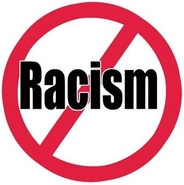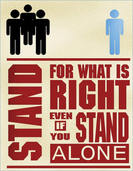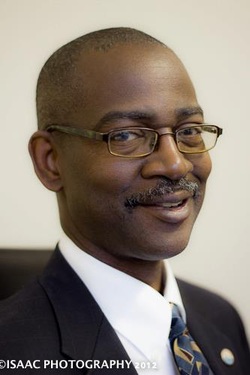 Now that I have your attention let me explain why. As an African American there is nothing that I can do to eradicate racism. Racism is a mindset, it's a cultural philosophy. Racism is owned by those who choose to be racist. I can expose them. I can embarrass them. I can even put them in the uncomfortable position of apologizing. If I'm lucky, I can even impact them financially. The one thing that I cannot do is stop a racist from being a racist. In all likelihood an exposed racist may become more racist because they were exposed. I'm getting a little tired of the media frenzy when someone is exposed for the racial comments they make. Don't get me wrong, I do a little happy dance every time but there are so many other things affecting us that the media could be giving a little more attention. Sometime I feel as if the media is saying "we caught one, be happy, we're the good guys". On Sunday Africanglobe published an article titled Is Wendy’s Racist? Apparently, Their Scholarships Only Go to White Students. Wendy’s, the third largest fastfood restaurant chain in the world, is being heavily criticized for the way they administer their scholarship program. My response to the article was:
 I met a gentleman at a function I attended representing the Marketplace. I shared with him the mission of our organization and the importance of social responsibility. As our conversation progressed he said that there are things that we as African Americans need to say that are being left unsaid. I knew exactly what he meant and we continued to have a very frank and fruitful discussion. I thought about our conversation and decided if there’s something that needs to be said I’m going to say it. After all, isn’t that the socially responsible thing to do? We will not progress unless we are willing to accept the fact that we need to shoulder some of the responsibility for our current condition. If we want to accept the accolades for our successes and accomplishments we must also shoulder some of the responsibility for our failures and missteps. We cannot place the entire blame for our situation on external conditions. Don't get me wrong, there are a multitude of things affecting African Americans that we have little or no control over. African Americans cannot eradicate racism. We cannot change the cultural philosophy of those who promote exclusion versus inclusion. I am not absolving anyone of their actions. All I'm saying is we need to spend more time looking inward at our own behavior and start doing a better job of holding people accountable for their actions. One of the controversial lines in Lil Wayne's song Karate Chop is "Beat that p---y like Emmett Till". This one line has received notoriety and forced Lil Wayne to issue an apology. He also lost a couple of advertisers. I've read the lyrics of the entire song and that is not the only line I have an issue with. In my opinion the song is extremely degrading to women. Lil Wayne's apology does not mean much to me. There's a lot of money at stake in the rap game and I believe he did what he had to do to protect his financial interests.
To add insult to injury, there are those that find nothing wrong with the song. Rapper-singer Future commented:  Click for a larger image Click for a larger image At some point in our lives we’ll reflect on and reminisce about the good old days. We'll talk about how we had simpler life. We’ll say “I’m glad I’m not a young person today, there are so many hurdles they have to navigate. We did not have to deal with gun violence, student debt, high unemployment, failing schools, and a myriad of other issues that our youth are facing today”. We’ll tend to forget that there were challenges when we grew up also. It’s human nature to look at the past and remember the good things; it’s a personal form of revisionist history. Although we’ll look at our past with nostalgic reverence most of us will acknowledge it for what it is. The past is the past. It is dead and buried. We should remember it, pay homage to it, and use it to build our future by continuing to move forward. Unfortunately there is a rising segment of the population in our country that literally wants to go back to the good old days. They want to go back to “traditional American values”. The simpler life for them was also a time of dominance and power. This movement is happening in plain sight and we are unwilling participants watching it happen. Many of the landmark judicial and legislative decisions that happened in the last 50 years are being challenged, manipulated, and in some cases overturned. Let's take a look at a few examples.  I question the commitment of our politicians when it comes to the education of our young people. Educating young minds takes more than classroom instruction and standardized exams. It requires a commitment to nurture students and expose them to a myriad of educational and cultural opportunities. How can this happen if one of the first things on the chopping block during budget discussions is funding for after-school programs and the arts. I.S. 318 in Brooklyn, New York received national attention thanks to the award winning film Brooklyn Castle. Their chess team has won more national championships than any other in the country. They were the first middle school team to win the United States Chess Federation's national high school championship. According to an article in the New York Daily News, the team from I.S. 318 currently receives $20,000 from the New York City, money that could go away if the proposed budget, which calls for $130 million to be cut from childcare and after-school programs is passed by the city council. Is this how we invest in our children's future? In April 2012, after winning the National High School Chess Championship, the middle school students attended a ceremony inside City Hall. Mayor Bloomberg was quoted saying “I was really impressed with you guys,....You’re a lot smarter than I am.” I guess cutting the budget for after-school programs is how he shows his appreciation. I will be the first to admit the Civil Rights movement fascinates me. I find it striking that common, everyday people, with singleness of purpose, rose to the occasion to fight for what they believed in. These pioneers who we now call freedom fighters put their lives on the line to bring attention to social injustice. They were true trailblazers. Some of their lives ended too early, they were not able to see the fruits of their labor and conviction. Some of them continue to fight the good fight to this day.
The title of this article asks a rhetorical question. It has been over 50 years since the beginning of the movement. Although we face many new issues, some of them are just new faces on old problems. Social injustice, racism, poverty, and educational disparity to name a few still exist. Have things changed for the better because of the movement? Without a doubt I would say yes. Is there still much work to be done? I say most definitely. Are we prepared to fight with the conviction of those who blazed the trail to effect change? That is the question we must answer. In my opinion it is important that we understand where we came from to be better prepared for the work that needs to be done now. There are so many stories to share, more than I can put into a single article. I've share a few of them here. I encourage you to click on the links and read further. |
EditorErnest R. Heyward is the Founder and President of the Marketplace for Social Awareness and Social Responsibility Inc. Categories
All
Archives
June 2020
|
MARKETPLACE FOR SOCIAL AWARENESS AND SOCIAL RESPONSIBILITY INC.



